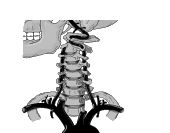Note that some links will break as pages are moved, websites are abandoned, etc.
If this happens, please try searching for the page in the Wayback Machine at www.archive.org.

Adverse events associated with spinal manipulation. Regarding neck manipulation, the risk/benefit ratio for the procedure appears to be in question due to the availability of safer options.
NOTE: In the UK, there appears to be no publicised national system for reporting adverse events related to chiropractic treatment. Furthermore, the UK General Chiropractic Council's current promotional literature appears to make no mention of serious risks.
Related links
Cervical manipulation, specifically chiropractic manipulation, is an important cause of vertebrobasilar and occasionally carotid distribution strokes. Journal of Neuroophthalmology (December 2000)
Patients at risk of stroke after chiropractic manipulation may not be identified a priori. Journal of Neurology (August 1999)
"The literature does not demonstrate that the benefits of manipulation of the cervical spine outweigh the risks." Professional Perspective by Richard P. di Fabio. Physical Therapy (January 1999)
This case report describes a 58-year-old woman who was treated by a chiropractor with neck manipulation (high-velocity thrust) for neck pain. Immediately after the third session, the patient experienced neurolgical symptoms. She saw a neurologist and was admitted to hospital 3 days later. The diagnosis was confirmed by magnetic resonance imaging (MRI). American Journal of Neuroradiology (August 1998)
Concludes that cerebral infarct may occur as a result of chiropractic neck manipulation. American Journal of Ophthalmology (1997)
"This report describes four patients with cervical myelopathy and/or radiculopathy caused or aggravated by spinal manipulation. In one patient, magnetic resonance scans before and after chiropractic treatment strongly suggests that the disc prolapse syndrome experienced by the patient was provoked by the spinal manipulation." Spinal Cord. (August 1996)
An authoritative systematic review: "It is difficult to estimate the incidence of SMT (spinal manipulative therapy) complications, as they are probably underreported in the literature…Referral for SMT should not be made to practitioners applying rotatory cervical manipulation." Journal of Family Practice (May 1996)
Neurology (June 1995)
This review describes two patients with spinal cord injuries associated with SMT (spinal manipulative therapy) and establishes the risk/benefit ratios for patients with lumbar or cervical pain. An analysis of these cases and 138 cases reported in the literature demonstrates six risk factors associated with complications of SMT. Neurosurgery (July 1993)
Complications caused by manipulation therapy in 3 cases of spine condition and 22 cases of vertebral disc disease observed in relatively short period of time are presented. The authors conclude that manual therapy not preceded by precise diagnosis is highly hazardous. Chir Narzadow Ruchu Ortop (1993)
Although chiropractic treatment is a popular alternative, its long-term effect is questionable and the medical literature contains numerous reports of patients whose condition worsened as a result of it. Postgraduate Medicine (May 1988)
"Medical and surgical complications of chiropractic manipulation occur infrequently in relation to the number of procedures performed. These complications include intracranial hemorrhage, spinal cord injuries, trauma to the carotid and vertebral arteries, and vertebral-basilar distribution infarction. This is a report of a case of vertebrobasilar infarction following chiropractic manipulation leading to a comatose state within 1 h following the manipulative procedure. This case report should alert the forensic pathologist to the possibility of cervical manipulation as a cause of acute brainstem infarction, and the mechanism and the predisposing factors to injury should be reviewed. The importance of careful autopsy technique and use of postmortem arteriographic techniques are emphasized." Journal of Forensic Sciences (July 1987)
Laryngoscope (1986)
South Med. Journal (1983)
CONCLUSION: There is no robust data concerning the incidence or prevalence of adverse reactions after chiropractic. Further investigations are urgently needed to assess definite conclusions regarding this issue. Spine. 2009 May 15;34(11):E405-13





